Introduction: The Rise of Veganism
Veganism has taken the world by storm, with more people than ever embracing plant-based diets. But as this lifestyle gains popularity, it’s crucial to take a closer look at the nutritional aspects of vegan recipes. Are they really as healthy as we think? Let’s dive into some shocking truths that might make you rethink everything you know about vegan nutrition.
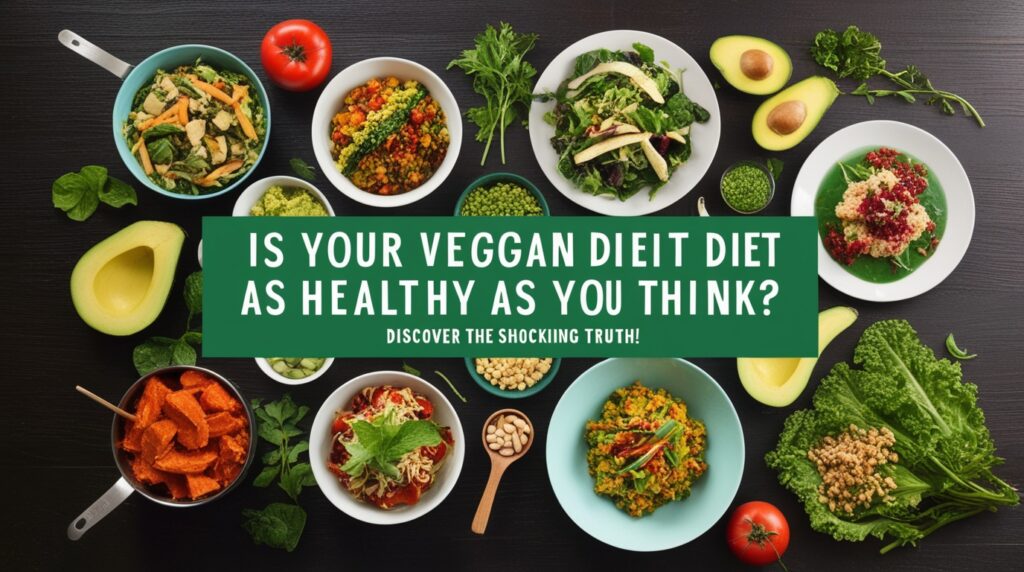
The Nutritional Landscape of Vegan Diets
Before we delve into the surprising facts, let’s set the stage by understanding the key nutritional components of vegan diets.
Protein: The Building Blocks of Life
Contrary to popular belief, getting enough protein on a vegan diet is possible. However, it requires careful planning and a diverse range of plant-based protein sources.
Iron: A Critical Mineral
Iron deficiency is a concern for many vegans, as plant-based iron sources are not as easily absorbed by the body as animal-based ones.
Vitamin B12: The Elusive Nutrient
Vitamin B12 is naturally found only in animal products, making it a critical nutrient for vegans to supplement or obtain through fortified foods.
Shocking Truth #1: Not All Vegan Recipes Are Nutritionally Complete
Here’s a truth bomb for you: just because a recipe is vegan doesn’t automatically make it nutritionally balanced. Many vegan recipes focus on replacing animal products without considering the overall nutritional profile. This can lead to meals that are lacking in essential nutrients like protein, iron, or vitamin B12.
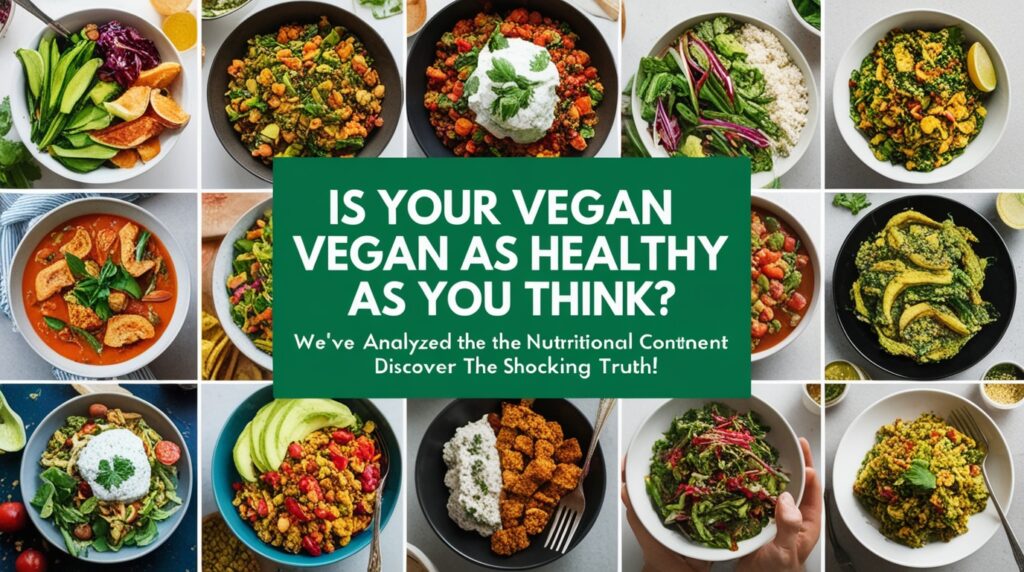
For example, a vegan pasta dish made with white pasta and tomato sauce might be delicious, but it’s nutritionally incomplete. It lacks protein and essential vitamins and minerals found in a more balanced meal.
Shocking Truth #2: Some Vegan Recipes Are Higher in Calories Than Expected
Surprise, surprise! Some vegan recipes can pack quite a caloric punch. The misconception that all vegan food is low in calories can lead to overindulgence and unexpected weight gain.
Take vegan desserts, for instance. They often rely on high-calorie ingredients like coconut oil, nuts, and dates to achieve the desired taste and texture. A slice of vegan cheesecake can easily contain more calories than its dairy-based counterpart!
Shocking Truth #3: Processed Vegan Foods Can Be Unhealthy
Not all vegan food is created equal. Processed vegan foods, like plant-based burgers or vegan cheese, can be high in sodium, unhealthy fats, and artificial additives. These foods, while convenient, may not offer the health benefits associated with a whole-food, plant-based diet.
It’s easy to fall into the trap of thinking that any vegan product is automatically healthy. But remember, potato chips and Oreos are vegan too!
Shocking Truth #4: Vegan Diets May Lack Certain Amino Acids
Proteins are made up of amino acids, and while plants contain all nine essential amino acids, some are present in lower amounts compared to animal products. This means vegans need to be mindful of combining different protein sources to ensure they’re getting a complete amino acid profile.
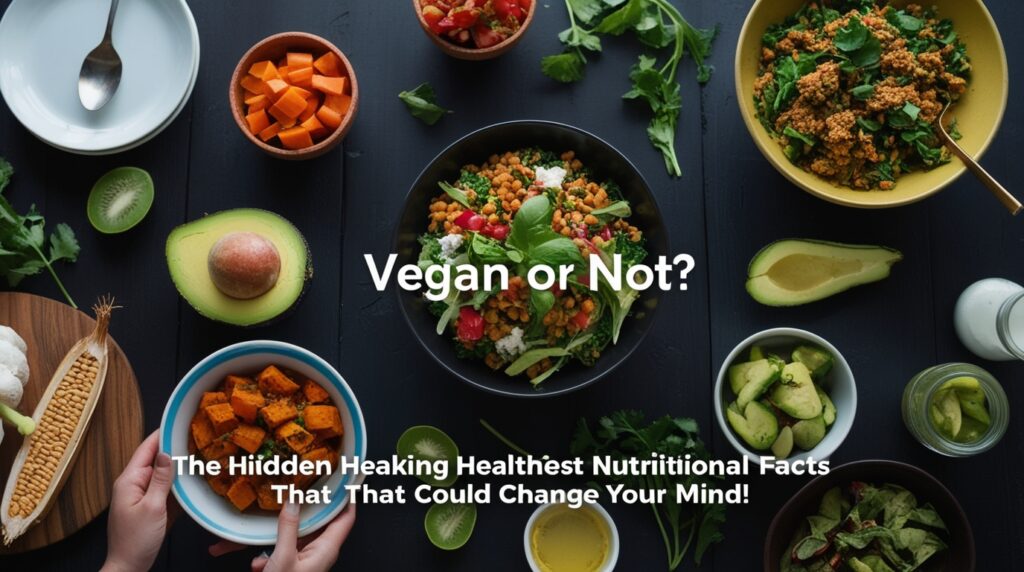
For instance, rice and beans are a classic combination that provides all essential amino acids. But a recipe that relies solely on one plant protein source might not offer the same completeness.
Shocking Truth #5: The Hidden Sodium in Vegan Recipes
Many vegan recipes rely heavily on salt to enhance flavor, especially when trying to replicate the taste of animal products. This can lead to surprisingly high sodium levels in some vegan dishes.
For example, a homemade vegan “cheese” sauce might contain nutritional yeast, miso paste, and added salt – all significant sources of sodium. While delicious, consuming such dishes regularly could contribute to excessive sodium intake.
Balancing Act: Creating Nutritionally Sound Vegan Meals
Now that we’ve uncovered these shocking truths, let’s talk about how to create balanced vegan meals that meet all your nutritional needs.
Protein Combinations
Focus on combining different plant proteins to ensure you’re getting all essential amino acids. Think quinoa with lentils, or hummus with whole grain pita.
Iron-Rich Plant Sources
Incorporate iron-rich foods like spinach, lentils, and fortified cereals into your meals. Pair them with vitamin C-rich foods to enhance iron absorption.
Fortified Foods and Supplements
Don’t shy away from fortified foods or supplements, especially for nutrients like vitamin B12 and vitamin D that are harder to obtain from plant sources alone.
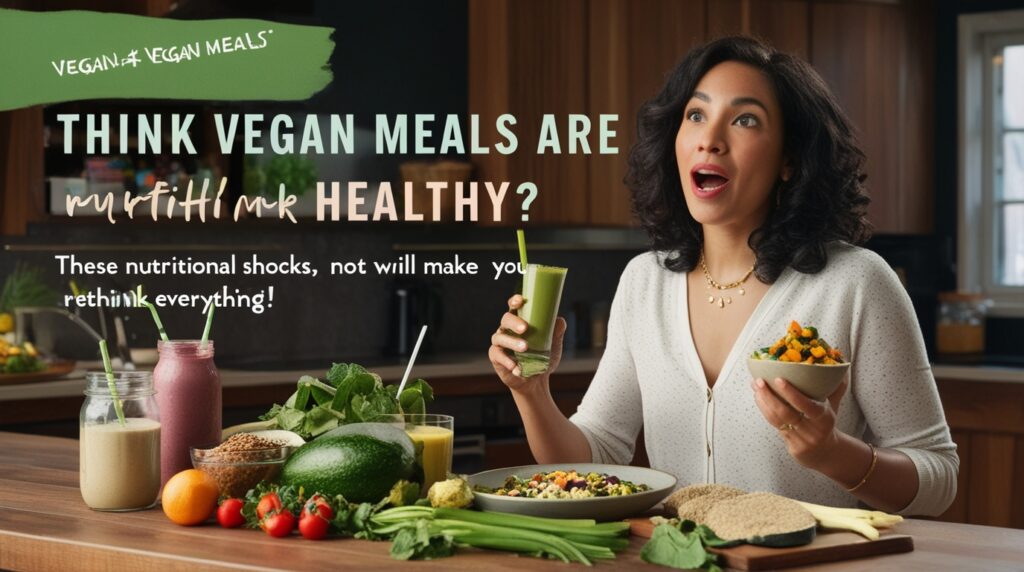
The Importance of Meal Planning in Vegan Diets
Meal planning is crucial for maintaining a balanced vegan diet. It helps ensure you’re getting a variety of nutrients throughout the week and can prevent reliance on processed vegan convenience foods.
Try planning your meals around different protein sources each day, and make sure to include a rainbow of fruits and vegetables for a wide range of vitamins and minerals.
Debunking Vegan Myths: What the Science Says
Let’s take a moment to address some common myths about vegan diets. No, you won’t become protein deficient if you go vegan. And no, soy doesn’t cause hormonal imbalances (unless consumed in extreme quantities).
However, it’s true that vegans need to pay special attention to certain nutrients like vitamin B12, iron, and omega-3 fatty acids. The key is education and mindful eating.
The Environmental Impact of Vegan Diets: A Double-Edged Sword
While vegan diets are often touted as environmentally friendly, the truth is a bit more complex. Yes, plant-based diets generally have a lower carbon footprint than meat-heavy diets. However, some vegan staples like almonds and avocados have significant environmental impacts due to water usage and transportation.
The lesson here? Even within a vegan diet, some choices are more environmentally friendly than others. Opt for local, seasonal produce when possible to minimize your environmental impact.
Vegan Recipes: A Closer Look at Popular Dishes
Let’s examine some popular vegan recipes to understand their nutritional profiles better.
Nutritional Analysis of Vegan Burgers
Vegan burgers can vary widely in their nutritional content. A homemade black bean burger can be a nutritional powerhouse, rich in fiber and protein. On the other hand, some store-bought vegan burgers are high in sodium and processed ingredients.
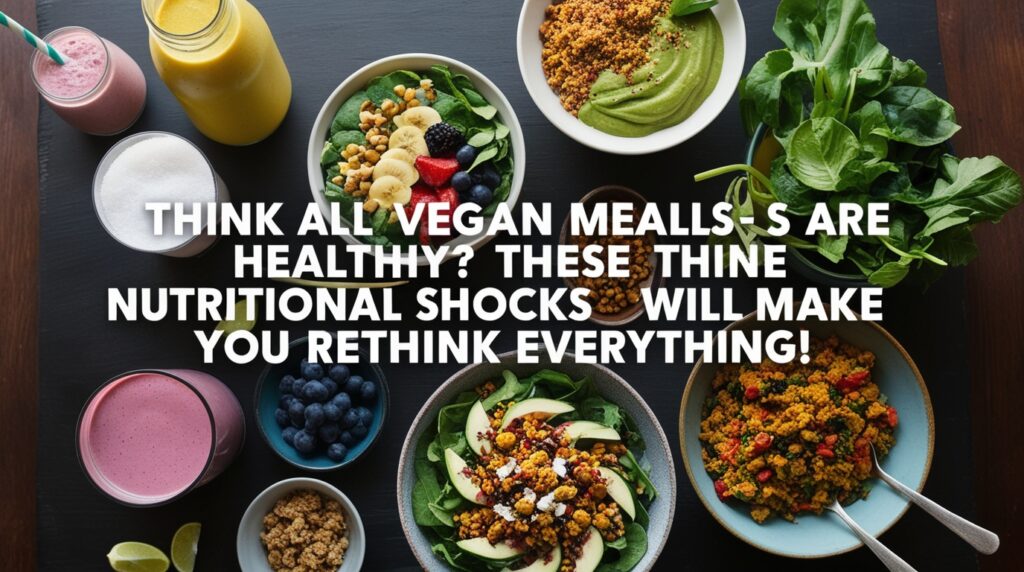
The Truth About Vegan Cheese Alternatives
Vegan cheese alternatives have come a long way in terms of taste, but nutritionally, they often fall short compared to dairy cheese. Many are low in protein and calcium, and high in saturated fats from coconut oil.
The Future of Vegan Nutrition: Innovations and Challenges
The world of vegan nutrition is constantly evolving. Innovations in food technology are creating more nutritionally complete plant-based products. However, challenges remain in ensuring these products are accessible and affordable for all.
As consumers, we need to stay informed and critical, always reading labels and understanding what we’re putting into our bodies.
Conclusion: Embracing a Balanced Approach to Veganism
These shocking truths about vegan recipes don’t mean we should abandon plant-based diets. Rather, they highlight the importance of a balanced, informed approach to veganism.
By understanding the nutritional landscape of vegan diets, we can make better choices, create more balanced meals, and truly harness the health benefits of plant-based eating. Remember, veganism isn’t just about eliminating animal products – it’s about nourishing our bodies with the incredible variety of plant foods available to us.
So, the next time you’re whipping up a vegan recipe, take a moment to consider its nutritional profile. Are you getting a good balance of nutrients? Could you add something to make it more nutritionally complete? With a little knowledge and creativity, you can create vegan meals that are not only delicious but also nourishing and balanced.
Get More Information about Vegan and Plant Based Recipes
Frequently Ask Questions
- Can I get enough protein on a vegan diet?Yes, you can get enough protein on a vegan diet by consuming a variety of plant-based protein sources like legumes, nuts, seeds, and whole grains.
- Are all vegan products healthier than their non-vegan counterparts?Not necessarily. Some vegan products can be highly processed and high in calories, sodium, or unhealthy fats. It’s important to read labels and choose whole foods when possible.
- Do I need to take supplements on a vegan diet?While it’s possible to meet most nutritional needs through a well-planned vegan diet, many experts recommend supplementing with vitamin B12, and potentially vitamin D and omega-3s.
- Can children follow a vegan diet safely?Yes, children can follow a vegan diet safely, but it requires careful planning to ensure they’re getting all necessary nutrients for growth and development. Consult with a pediatrician or registered dietitian for guidance.
- How can I ensure I’m getting enough iron on a vegan diet?Consume iron-rich plant foods like leafy greens, legumes, and fortified cereals. Pair these with vitamin C-rich foods to enhance iron absorption. If concerned, have your iron levels checked by a healthcare provider.

